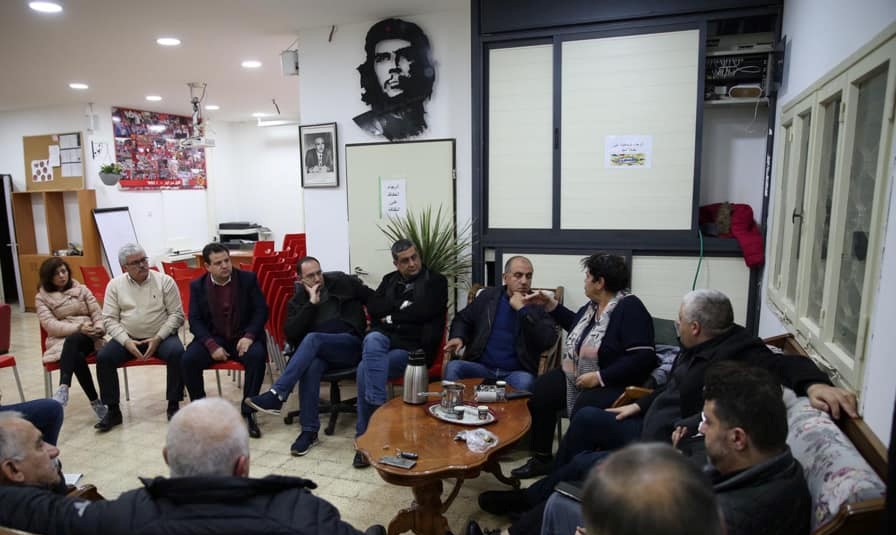Leaders of the four parties making up the Joint List believe their alliance will be able to secure 15 Knesset seats in the upcoming March 2 election, after they succeeded in submitting their roster of Knesset candidates with no traces of the internal strife that plagued the list in the April and September elections. The four parties which ran on two separate slates in the April election, and which were dogged by internal debates over the distribution of seats within the slate ahead of the September election, are projecting an air of unity and optimism this time around.

MK Ayman Odeh (third from left) during a meeting of Hadash’s local leadership in Nazareth, last Thursday, January 16 (Photo: Al Ittihad)
Chairman of the Joint List, MK Ayman Odeh (Hadash) said in an interview with Haaretz that the goal of 15 seats is possible. According to Odeh, the slate’s involvement in social issues over recent months, namely in the struggle against violence in the Arab-Palestinian community in Israel and against racist legislation dealing with the demolition of unauthorized construction, dubbed the Kaminitz Law, has strengthened its position with the public. In addition, the fact that both Meretz and Labor (which will be running together) have demoted the Arab candidates on their respective rosters from the first to the second group of 10 candidates, will give the Joint List a good boost.
The Joint List believes that they will also be able to garner more support from progressive Jews in this election following the Meretz-Labor merger, undertaken by both parties to avoid the possibility that, running individually, they may fall below the electoral threshold of 3.25% or four MKs. “The Joint List is the authentic social and political Left in Israel,” said leading Communist Party of Israel member, MK Ofer Cassif (Hadash – Joint List). “Our main electoral base is the Arab community, but I’m sure, especially after the Labor-Meretz merger, there are more than a few Jews who support our message,” he added, “we’ll turn to the Jewish community and emphasize that.”
Three small Arab parties that ran independently in the September election have decided not to run in March, further reducing the chance of wasted votes. Two of these parties have thrown their support behind the Joint List. Although in the September election they only accounted for a few thousand votes, their abstention from contending this time is perceived as a move to boost confidence and reduce criticism of the Joint List.
A new poll published by Radio 103FM on Thursday, January 16, predicted that the Joint List will win 14 seats. According to the poll, which was conducted by the Ma’agar Mochot Institute led by Prof. Yitzhak Katz, the merged Labor-Gesher-Meretz list will win 10 seats, and the far-right pro-occupation Yamina will win 9 seats. The racist Otzma Yehudit, which decided to run alone after Jewish Home chairman Rabbi Rafi Peretz withdrew from an agreement with it and struck a deal with Yamina, will get about 1% of the vote which amounts to less than two seats and is well below the electoral threshold.
Other results in the Ma’agar Mochot poll: Blue & White is the largest party with 34 seats, followed by the Likud with 30, Shas with 8 and United Torah Judaism with 7 seats. Regarding the question of Prime Minister Binyamin Netanyahu’s request for immunity from prosecution, the opposition to such a move appears to be growing: 64% of respondents to the poll objected to Netanyahu’s request for immunity, compared to 53% of respondents in similar polls published last week, among them one conducted by the Ma’agar Mochot Institute.
Related:


